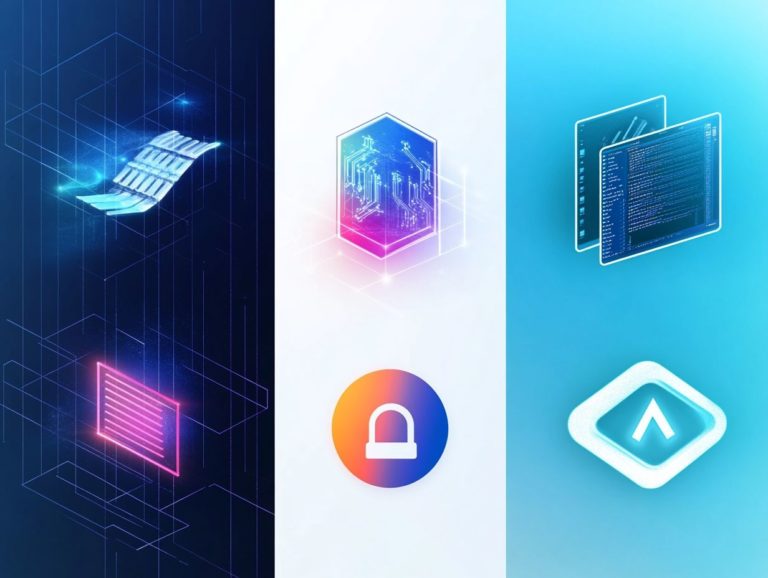How to Choose the Right IT Certification for You
In today s fast-paced tech landscape, IT certifications are essential for both professionals and employers.
These credentials enhance your career prospects and demonstrate your commitment to staying relevant in an ever-evolving industry. This article delves into the significance of IT certifications, showcasing how they benefit you and your employer alike.
You ll explore key factors to consider when selecting the right certification, as well as various types of certifications available.
Preparation strategies and tips for maintaining your credentials are also covered. Don’t miss out! Explore how the right certification can skyrocket your career!
Contents
- What are IT Certifications?
- Importance of IT Certifications
- Factors to Consider in Choosing an IT Certification
- Types of IT Certifications
- How to Prepare for an IT Certification Exam
- Maintaining and Renewing IT Certifications
- Preguntas Frecuentes
- Qu factores debo considerar al elegir la certificaci n de TI adecuada para m ?
- C mo determino qu certificaci n de TI beneficiar m s mi carrera?
- Qu recursos puedo utilizar para recopilar informaci n sobre diferentes certificaciones de TI?
- Necesito tener un background educativo espec fico o experiencia laboral para obtener una certificaci n de TI?
- C mo s si una certificaci n de TI es reconocida y respetada por los empleadores?
- Es beneficioso tener m ltiples certificaciones de TI?
Key Takeaways:

- Choose an IT certification that aligns with your personal interests and career goals.
- Consider the industry demand and relevance of the certification, as well as the cost and time commitment involved.
- Stay updated with continuing education requirements to maintain and renew your IT certification.
What are IT Certifications?
IT certifications serve as distinguished credentials, recognizing individuals who have shown their knowledge and skills in specific areas of Information Technology (IT).
Among the most sought-after options are:
- AWS Certified Cloud
- Certified Ethical Hacker: This certification validates skills in identifying and fixing security flaws.
- ITIL (Information Technology Infrastructure Library): A set of practices for IT service management.
These certifications validate your expertise in critical domains such as cloud computing, cybersecurity, network management, and project management. They also play a key role in advancing your career and fostering professional growth in the ever-evolving IT landscape.
Importance of IT Certifications
The significance of IT certifications in today’s competitive job market cannot be overstated. These credentials elevate your professional development and shape your career trajectory while boosting your earning potential.
Certifications serve as a testament to your skills and knowledge, enhancing your appeal to employers and often becoming a prerequisite for advanced positions within the IT sector.
Benefits for Career Advancement
Obtaining IT certifications offers many benefits. These can significantly enhance your career trajectory.
You’ll notice improvements in job performance, a notable increase in salary potential, and a broader professional network.
These certifications are a wise investment for anyone looking to elevate their standing in the IT field. For example, the AWS Certified Cloud Practitioner certification can truly be a game changer; studies show that those who hold it may experience an average salary increase of about 13% right after certification.
Individuals who pursue the Certified ScrumMaster credential often report enhanced project management skills, which frequently lead to promotions within their organizations.
Testimonials from professionals underscore the impact of these certifications. Many successfully transition into higher roles, crediting their career advancements directly to these credentials.
By validating your expertise and enhancing your skill set, these certifications unlock new job opportunities and position you as a valuable asset in the competitive IT landscape.
Benefits for Employers
Employers gain immensely by hiring certified professionals, as IT certifications often reflect enhanced job performance, productivity, and innovation within the workplace.
Certified employees bring validated expertise to the table, resulting in less training time and a stronger culture of professional development within teams.
Certifications such as GIAC Information Security and Certified Ethical Hacker empower your organization by ensuring your workforce is knowledgeable and current in addressing contemporary security challenges.
These credentials equip professionals with the skills needed to identify vulnerabilities and implement effective countermeasures. This allows your company to proactively tackle potential threats.
This elevated level of preparedness fosters greater trust from clients and partners, ultimately enhancing your organization s reputation and boosting its bottom line.
When your teams are armed with these validated skills, the benefits ripple throughout the entire organization, leading to improved efficiency, reduced risk, and a more resilient operational framework all of which contribute to your overall success.
In conclusion, obtaining IT certifications is beneficial for both professionals and employers, marking a crucial step in the journey toward excellence in the tech industry.
Factors to Consider in Choosing an IT Certification

When selecting an IT certification, consider several key factors to ensure it aligns with your career goals and market demands. For a comprehensive understanding, check out how to navigate the world of IT certifications. Evaluate industry relevance, your personal interests, and the cost and time involved in obtaining the certification.
This approach helps you make a decision that enhances your qualifications and positions you for future opportunities.
Industry Demand and Relevance
Understanding industry demand and the relevance of specific IT certifications is essential for informed career choices. This knowledge empowers you to select credentials, including the right project management certification, that are highly sought after.
In today s fast-paced landscape, cloud computing and networking are critical in IT. Skills in platforms like AWS and Cisco are particularly valued by employers. Job openings requiring these certifications surged by over 30% last year, showcasing the industry’s shift towards digital technologies.
Organizations are now moving their operations to the cloud. Professionals with AWS Certified Cloud Practitioner or Cisco Certified Network Associate certifications are in higher demand, setting the stage for long-term career success.
Personal Interests and Goals
Aligning your IT certifications with your personal interests is crucial for long-term satisfaction in your career. To help you in this process, finding the right certification for your career can boost motivation and fulfillment by ensuring you pursue certifications that resonate with your passions.
Reflect on your inclinations towards areas like security, cloud computing, or project management. This can help you identify IT certifications that enhance career advancement and ignite your enthusiasm.
If you’re intrigued by cybersecurity, the Certified Ethical Hacker program could be a perfect fit. If you aim to lead teams, the Certified ScrumMaster certification may align with your goals.
This alignment creates a powerful connection to your work, enhancing job satisfaction and promoting career longevity.
Cost and Time Commitment
Evaluating the cost and time commitment for IT certifications is crucial. Understanding these factors helps you gauge your ability to pursue your chosen career path effectively.
By knowing the financial investment required, you can prepare for potential expenses like exam fees and study materials. Additionally, factor in the preparation time, which can range from a few weeks to several months.
For instance, CompTIA A+ may require 20 to 30 hours of study each week, while advanced certifications from Microsoft could demand similar or even more dedication.
To ease the financial burden, explore options like:
- Payment plans
- Employer sponsorships
- Free online resources available on platforms like Coursera and edX
Types of IT Certifications
IT certifications cover a wide array of categories, including entry-level, advanced credentials, and specialized qualifications. This diversity creates pathways for professionals at different career stages, enabling you to choose the right certification for your aspirations.
Common Certifications and Their Specializations

Common IT certifications and their specializations offer a clear roadmap to understanding the skills required in various IT sectors. Whether you’re starting with entry-level certifications like CompTIA A+ or aiming for advanced qualifications such as Certified Ethical Hacker and AWS Certified Cloud, following the best practices for IT certification exam prep can help ensure there’s a path tailored for you.
These certifications enhance your employability and refine your technical expertise. For instance, if you re drawn to networking technologies, CompTIA Network+ is a perfect fit. Cisco’s CCNA showcases your skills in network installation and troubleshooting.
Each certification is designed with specific career goals in mind. Earning a Project Management Professional (PMP) credential can significantly elevate your leadership skills, especially if you aspire to take on managerial roles.
Specialized certifications like Microsoft Certified: Azure Solutions Architect Expert equip you for cloud environments. This aligns perfectly with the industry’s rising demand for cloud proficiency and opens the door to exciting career opportunities!
How to Prepare for an IT Certification Exam
Preparing for an IT certification exam demands a strategic approach. You ll want to blend effective study techniques with practice exams, all while developing a comprehensive understanding of the exam format. This combination will significantly enhance your chances of success and ensure you deliver a strong performance on test day.
Study and Practice Tips
Effective study and practice tips are vital for mastering the material covered in IT certification exams and empower you to reinforce your knowledge and confidence before the big day.
By creating a well-structured study schedule, you can allocate specific times for various topics, ensuring that you cover everything comprehensively.
Incorporating tools like flashcards will help you retain essential concepts and terminology, making it easier to recall information when it counts.
Joining study groups fosters a collaborative learning environment, allowing you to discuss and clarify doubts with peers.
Regularly taking practice exams will familiarize you with the exam format and question types, ultimately boosting your performance.
These strategies deepen your understanding of complex subjects and equip you with the skills needed to excel in certifications like ITIL 4 Foundation and Microsoft Certified.
Maintaining and Renewing IT Certifications
Maintaining and renewing IT certifications is a vital component of your professional development. By doing so, you ensure that you remain well-informed about the latest industry trends and technologies. This significantly enhances your value in the job market.
Continuing Education Requirements
Continuing education requirements for IT certifications are essential for your professional growth. They are crucial for renewing your credentials and ensuring your skills remain relevant in a constantly evolving tech landscape.
Among the myriad options available, workshops and online courses provide hands-on experiences and the flexibility to select what fits your schedule best. Webinars become invaluable resources for staying updated, featuring industry leaders who impart valuable insights.
For example, Cisco s CCNP certification necessitates ongoing educational activities to keep pace with networking trends. CompTIA mandates a minimum of 20 continuing education units over three years.
These efforts not only help you maintain your credentials but also empower you to adapt and thrive in a rapidly changing environment.
Watch This Overview on IT Certifications!
Preguntas Frecuentes

Qu factores debo considerar al elegir la certificaci n de TI adecuada para m ?
Al elegir la certificaci n de TI adecuada, you should look at tus objetivos profesionales, tu conjunto de habilidades actual, la demanda de la industria para la certificaci n, el costo y el compromiso de tiempo, y la reputaci n y credibilidad del organismo certificador.
C mo determino qu certificaci n de TI beneficiar m s mi carrera?
Para elegir una certificaci n de TI, mira qu trabajos hay y cu les certificaciones son populares. Eval a tus habilidades y piensa en tus metas profesionales.
Qu recursos puedo utilizar para recopilar informaci n sobre diferentes certificaciones de TI?
Explora foros en l nea y sitios de la industria. Tambi n, habla con profesionales que ya tengan la certificaci n que te interesa.
Necesito tener un background educativo espec fico o experiencia laboral para obtener una certificaci n de TI?
Los requisitos var an seg n la certificaci n y la entidad que la ofrece. Algunas piden educaci n espec fica o experiencia previa, mientras que otras no tienen requisitos.
C mo s si una certificaci n de TI es reconocida y respetada por los empleadores?
Busca certificaciones acreditadas por organizaciones de prestigio. Revisa ofertas de trabajo y pregunta a otros profesionales sobre sus experiencias.
Es beneficioso tener m ltiples certificaciones de TI?
Tener varias certificaciones puede mostrar tu diversidad de habilidades. Elige aquellas que se complementen y que te ayuden a avanzar en tu carrera.





